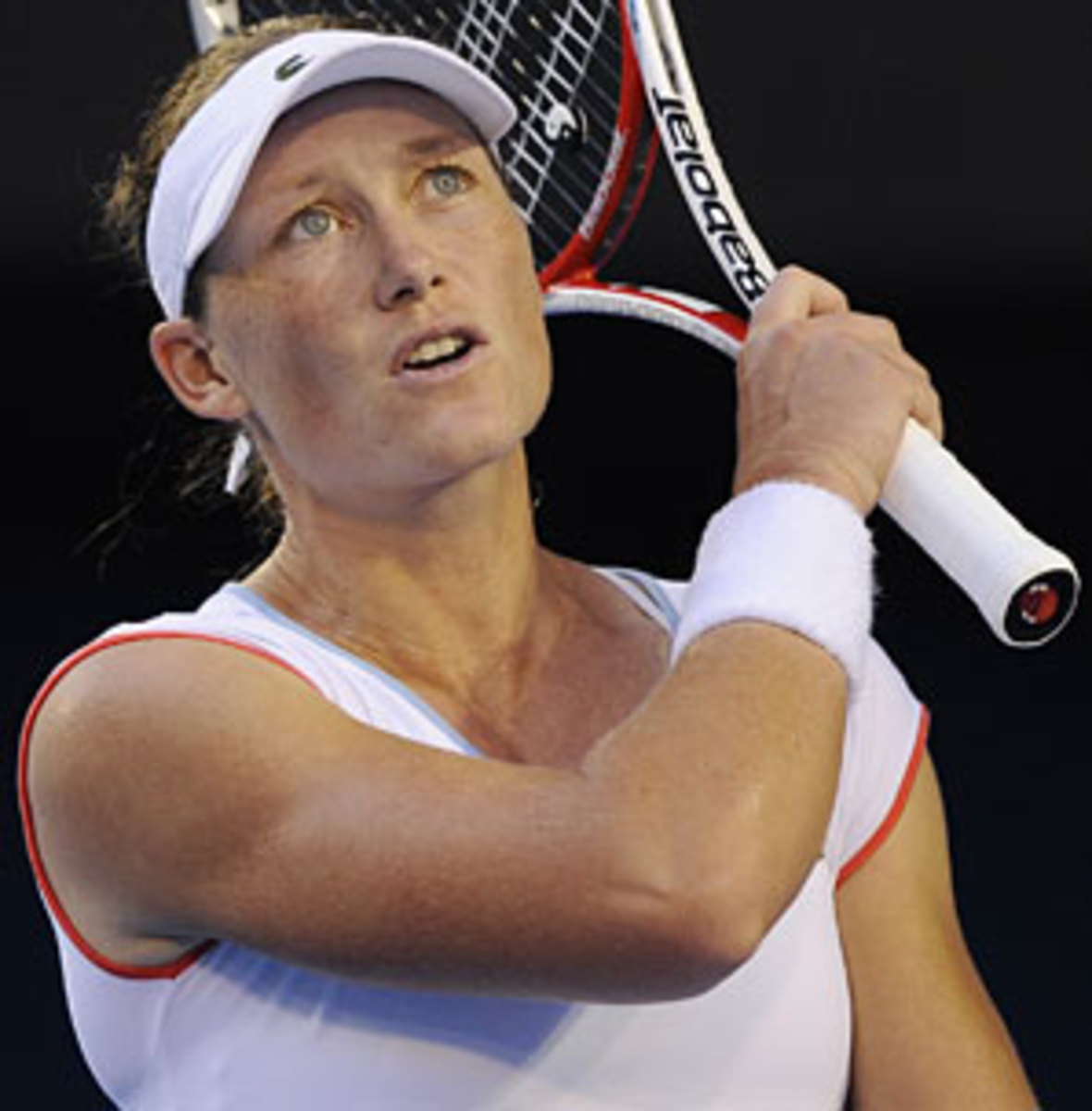Home-court disadvantages
If anyone can sympathize with the burden Andy Roddick endures as his country's singular hope, it's Australian No. 1 Sam Stosur (above). (AP)
MELBOURNE, Australia -- Andy Roddick is one of the more insightful guys in tennis when he wins. But when the top-ranked American loses, he closes off any attempts at conversation. His knack for going from defense to offense is almost Agassi-like. Every one of his answers becomes a variation of the same question: Are you done talking?
After his fourth-round loss to Switzerland’s Stan Wawrinka in straights on Sunday, Roddick was at his belligerent best. Check out this exchange:
Q: Did you see the stats? He got on top of you pretty well winners to winners. You only had a couple breakpoints there. Talk about your overall feeling of the match. It was clear you were trying to fight to get back in, but it didn't seem like you could dominate many of the points.
Roddick: Was that a question or a lot of statements back-to-back?
Let him blow off a little steam, though, and eventually he’ll ease back to waxing philosophically. When he was asked if he ever gets tired of carrying American tennis on his back, Roddick revealed a little more than frustration in his answer. He showed vulnerability -- a rarity for him.
“It’s tough,” he said. “I remember last summer when I was catching all the heat for not having an American guy in the top 10 for the first time in 15 years. Didn't really make sense to me that I was the one taking heat when I was the only guy that had been there for the last six years. I didn't know how I was catching it for that one. If I hadn't been there, it would have been for the last whatever it was. So it's a responsibility that has great benefits, and it's hard sometimes as well. You know, the benefits for me have far outweighed the kind of downside of it.”
That answer got me thinking about Australian No. 1 Sam Stosur, who suffered her own third-round loss on Saturday night. The following morning I was rifling through a copy of the local broadsheet, The Age, and froze when I got to the sports section. Stosur was the entire cover -- that wasn’t the shocker; she’s massively popular here. What had me coughing up Americano was the headline, writ large over giant picture of a shame-faced Stosur. OOPS, SHE DID IT AGAIN, it read.
Moreso than moldy, the rip was harsh. (You half-expected to turn the page and find an I-told-you-so column titled, I SAW THE SIGNS.) Sure, tennis is Australia’s most popular sport, Stosur is a megastar and we media are duty-bound to “speak truth to power.” But the real story here? Man bites dog, and a woman who had the talent to win this tournament, didn’t. It’s disappointing, yes, but hardly cause to kick an Aussie while she’s down.
If the snarky reaction -- just one harmony in a deafening national chorus -- had any redeeming value, it was in the much-needed context it brought to a television commercial I can’t quite escape. It might be the first I’ve seen in which an athlete inspires not confidence or even commerce, but depression. The ad, for a TV dinner, opens inside a snazzy but sterile skyscraper apartment overlooking a cityscape at dusk. Stosur, fresh off a lawn tennis win, arrives to an empty house. She turns on the TV as a newsreader starts recapping her triumph, grabs a dinner out the freezer and pops it in the microwave. Just as she sits down to nosh, her iPhone rings. “Hi dad,” she says cheerily. Then her tone changes, betraying a hint of sadness. “Yeah... tough match...”
Imagine a young Kobe Bryant pitching a video-dating service after whipping the Celtics, or a cat-covered Peyton Manning hawking Fancy Feast after pasting the Pats. (Jay Cutler? Sure. What’s strange is that it hasn’t happened yet.) Athletes are supposed to promote fantasy, not the fear that you might choke to death alone in your apartment.
You don’t watch the Stosur ad and suspend disbelief. You watch it and think, is this what it’s like to be your country’s best player? Is life this rough for individual athletes the States? Sure, some take their licks, but more often than not they have teams to provide them cover. And when they do get singled out, it’s for failing to live up to a contract, not a concept. We wouldn’t call ’em out if they didn’t deserve it, right?
And then I reconsidered Roddick and how, in 2005, we clobbered him after he bombed out of the first round of the U.S. Open. Like Stosur, he was featured in a worrying ad campaign, for American Express, that proved part prophecy, part allegory. (Still, his TV work reeked of confidence.) When he was beaten up the next year in the semis, a nation sighed, Justgive it up already.
won






